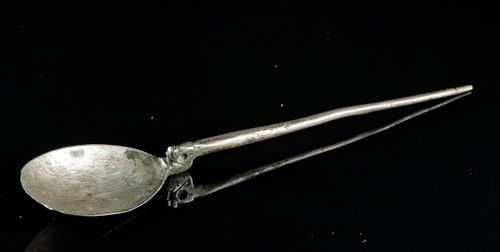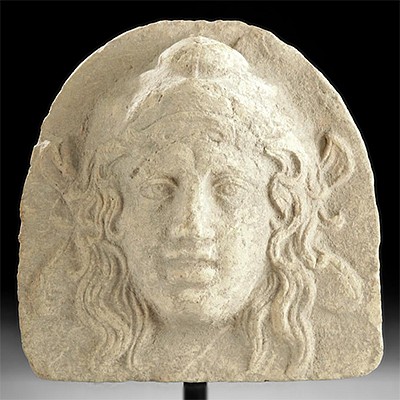Fine Roman Silver Cochlearium, 13.9 g
Lot 69a
About Seller
Artemis Fine Arts
686 S Taylor Ave, Ste 106
Louisville, CO 80027
United States
Selling antiquities, ancient and ethnographic art online since 1993, Artemis Gallery specializes in Classical Antiquities (Egyptian, Greek, Roman, Near Eastern), Asian, Pre-Columbian, African / Tribal / Oceanographic art. Our extensive inventory includes pottery, stone, metal, wood, glass and textil...Read more
Categories
Estimate:
$2,000 - $3,000
Absentee vs Live bid
Two ways to bid:
- Leave a max absentee bid and the platform will bid on your behalf up to your maximum bid during the live auction.
- Bid live during the auction and your bids will be submitted real-time to the auctioneer.
Bid Increments
| Price | Bid Increment |
|---|---|
| $0 | $25 |
| $300 | $50 |
| $1,000 | $100 |
| $2,000 | $250 |
| $5,000 | $500 |
| $10,000 | $1,000 |
| $20,000 | $2,500 |
| $50,000 | $5,000 |
| $100,000 | $10,000 |
| $200,000 | $20,000 |
About Auction
By Artemis Fine Arts
Feb 27, 2020
Set Reminder
2020-02-27 10:00:00
2020-02-27 10:00:00
America/New_York
Bidsquare
Bidsquare : VARIETY SALE | Antiquities & Ethnographic Art
https://www.bidsquare.com/auctions/artemis-gallery/variety-sale-antiquities-ethnographic-art-4920
Around the world & back in time - be amazed at the treasures you will find. Antiquities from Egypt, Greece, Italy and the Near East, Asian, Pre-Columbian, African / Tribal / Oceanic, Native American, Spanish Colonial, Russian Icons, Fine Art, much more! Artemis Fine Arts info@artemisgallery.com
Around the world & back in time - be amazed at the treasures you will find. Antiquities from Egypt, Greece, Italy and the Near East, Asian, Pre-Columbian, African / Tribal / Oceanic, Native American, Spanish Colonial, Russian Icons, Fine Art, much more! Artemis Fine Arts info@artemisgallery.com
- Lot Description
Roman, Imperial Period, ca. 3rd to 4th century CE. A shallow spoon made from a silver-copper alloy (64% silver) known as a cochlearium in Latin. A small tang connects the ovoid bowl to the needle-shaped handle which gradually narrows to a point for use in extracting snails or seafood from their shells. The spoon is a fascinating cultural object, often a prized personal item at a time when the average person owned very little; spoons made of precious metal were so highly valued that they were often listed in inventories of noble households. In fact, they were so treasured that cochlearia made of silver have been found in various treasure hoards. Size: 5.875" L x 1" W (14.9 cm x 2.5 cm); quality of silver: 64%; total weight: 13.9 grams.
From the British Hoxne Hoard, which is the largest collection of late Roman silver and gold found in Britain (and contains the largest collection of gold and silver coins from that time period found anywhere in the Roman Empire), we know that spoons of a later date, from the Christian period, are usually inscribed with Chi-Rhos or other Christian symbols. The lack of inscription on this piece suggests that it is from a pre-Christian time or was owned by a pagan family.
Provenance: private East Coast, USA collection; ex-Neil Phillips collection, New York, New York, USA, acquired in the 1980s
All items legal to buy/sell under U.S. Statute covering cultural patrimony Code 2600, CHAPTER 14, and are guaranteed to be as described or your money back.
A Certificate of Authenticity will accompany all winning bids.
We ship worldwide and handle all shipping in-house for your convenience.
#144445Minor nicks to bowl edges, slight bending to overall form of handle, with very light abrasions, otherwise intact and excellent. Fine patina throughout.Condition
- Shipping Info
-
All shipping is handled in-house for your convenience. Your invoice from Artemis Gallery will include shipping calculation instructions. If in doubt, please inquire BEFORE bidding for estimated shipping costs for individual items.
-
- Buyer's Premium



 EUR
EUR CAD
CAD AUD
AUD GBP
GBP MXN
MXN HKD
HKD CNY
CNY MYR
MYR SEK
SEK SGD
SGD CHF
CHF THB
THB












